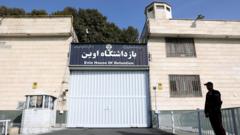Following US airstrikes on Iranian sites aimed at curbing nuclear ambitions, Donald Trump publicly speculated about potential regime change in Iran, diverging from official US defense positions. This provoked strong reactions amid escalating tensions, with significant concerns regarding international stability and US military involvement.
Trump Raises Regime Change Speculation Amid US Airstrikes on Iran

Trump Raises Regime Change Speculation Amid US Airstrikes on Iran
Amidst military actions targeting Iranian nuclear facilities, former President Trump suggests the possibility of regime change, sparking debate among US officials.
Former President Donald Trump has ignited discussions about regime change in Iran after the United States, alongside Israel, launched airstrikes on Iranian nuclear sites. In a social media post on Sunday, Trump questioned, “why wouldn’t there be a Regime change???” His remarks followed military actions targeting three Iranian sites, which US officials stated aimed to halt Tehran’s advancing nuclear program rather than orchestrating a change in leadership.
This speculation from Trump contrasts sharply with statements made by current US officials, including Defence Secretary Pete Hegseth, who affirmed that the military actions were not intended as a regime change effort. Additionally, Vice-President JD Vance echoed this sentiment, reinforcing the official stance that targeted strikes should focus on Iran's nuclear capabilities, not political structures.
Trump’s historical positions on foreign intervention, particularly his critiques of the 2003 Iraq War, highlight a complex viewpoint that combines a desire for decisive action with a guiding principle of avoiding prolonged overseas conflicts. In his latest commentary, he expressed a wish for the current Iranian leadership to “MAKE IRAN GREAT AGAIN,” invoking phrases reminiscent of his campaign slogans.
However, the immediate aftermath of the strikes has raised questions regarding their impact and the potential for escalation. Elliott Abrams, a former envoy to Iran under Trump, pondered the seriousness behind the recent speculation, suggesting that Trump may not be entirely earnest.
The escalation of violence began after a week of heightened tensions where Israeli Prime Minister Benjamin Netanyahu indicated a need to eliminate Iran’s nuclear capabilities. Post-strike, Iran reacted vehemently, threatening “everlasting consequences.” Concurrently, Israel reported missile fire from Iran, heightening military readiness across US bases in the region.
In this context, a sensitive geopolitical landscape unfolds as Iranian lawmakers move to contemplate closing the Strait of Hormuz, a crucial passage for global oil shipments. This potential decision has led to urgent calls from US Secretary of State Marco Rubio for China to intervene to prevent any such closure.
As international responses formulate, the implications of Trump's comments and the military actions taken are scrutinized, sparking debates about American foreign policy and its repercussions on international peace and security. The possibility of renewed military engagement in the Middle East looms large, raising concerns among lawmakers across the political spectrum regarding constitutional authority and the prospect of entering another conflict.





















